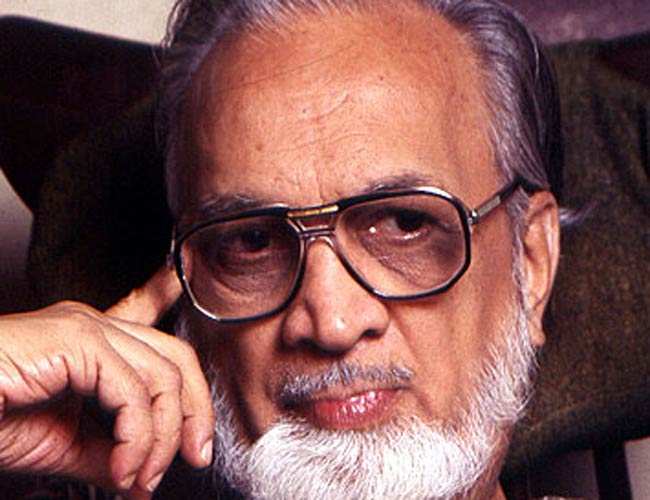Maharashtra News Desk!! Vijay Tendulkar (English: Vijay Tendulkar, born: 6 January 1928 – died: 19 May 2008) is a pioneer in the development of modern Indian drama and theatre. Tendulkar, who was active for more than five decades, besides writing for theater and films, also wrote stories and novels.
Introduction
Vijay Dhondopant Tendulkar, born in a Brahmin family on January 6, 1928 in Kolhapur, Maharashtra, wrote his first story at the age of just six years. His father, along with his job, also ran a small publishing business, so he got the environment of study at home itself. Growing up watching western plays, Vijay wrote, acted in and directed his first play at the age of just 11. He had a deep understanding of human nature. Vijay worked in newspapers in his early days.
Even later he continued writing for newspapers. At the age of forty-two, he decided to leave his studies and join the freedom movement. In fact his writing started by writing for newspapers. At the age of twenty, he wrote two plays, ‘Amayachar Kon Prem Karen’ (Who will love us) and ‘Grihastha’. But these plays did not get any success. This broke young Tendulkar’s enthusiasm and he decided not to write the play. But his writing once again hit his stride and in 1956 he wrote ‘Shrimant Tak’. The play depicted an unmarried mother’s decision to give birth to her child despite her wealthy father’s refusal. It was highly appreciated in the drama world. This play was strongly criticized by the then conservatives, but it had no effect on Tendulkar.
Marathi magazine and theater
After starting his active life in Marathi journalism, he emerged like a comet on Indian theater in the late seventies. His play Shantura Court Chalu Aahe became so popular due to its revolutionary content and structure, that within no time it was translated into many languages.[3] It has been translated and presented hundreds of times in the country and abroad. ‘Peace! ‘Court Chalu Aahe’, ‘Ghasiram Kotwal’ and ‘Sakharam Binder’ are the most famous plays written by him. Some of his plays had to face opposition in the seventies, but the fact that these plays related to reality are being staged even today is a proof of their acceptance.
theater theater
Vijay Tendulkar started doing new experiments in plays through his theater group ‘Rangayan’. In this work he got support from Shriram Lagoo, Mohan Agashe and Sulabha Deshpande. These new artists gave theatrical form to Tendulkar’s works. In 1961, he wrote the play ‘Gidwe-Gidwe’, but due to the completely new subject of this play, it could be performed nine years later in 1970. In this play, the morally broken structure of the family and the hidden forms of violence were shown in the language of colour. Tendulkar redefined domestic, gender-based, communal and political violence in this play. This drama took him to great heights in the theater world. Based on Drig Durmer’s short story ‘Traps’, he wrote a play ‘Shantata Court Chalu Aahe’ (The silent court continues). This play, written and performed in 1967, created a stir in the theater world and established him as an accomplished writer. The popularity of this play remains the same even after forty years. Even today, the huge crowd of people attending its staging proves this. In 1972, another play ‘Sakharam Binder’ came from the pen of Tendulkar. This play, which highlights the conflicts of morality and values, was liked a lot by the critics as well as the audience. But in the same year he wrote another play ‘Ghasiram Kotwal’. This play, which reflected the weaknesses of the Maratha rule in the eighteenth century, had an element of immortality.[4]
creations
Tendulkar’s plays like ‘Gidhaade’, ‘Kamala’, ‘Kanyadan’ etc. also became much talked about. Vijay Tendulkar has composed more than fifty plays. Thirty of his plays have been translated and staged in Hindi. Hindi translation of ‘Bhoot’ in the year 2007 and ‘Vithala’ and ‘Ek Ziddi Ladki’ in the year 2008 has also been published. Tendulkar’s image was accepted in the theater world through plays like ‘Khamosh Adalat Jari Hai’, ‘Vulture’, ‘Sakharam Binder’, ‘Jati Hi Poochho Sadhu Ki’, ‘Ghasiram Kotwal’, ‘Kanyadan’, ‘Kamala’ etc. Could not remain confined within the limits of Marathi playwright.
Translation and staging
His famous play ‘Ghasiram Kotwal’ has been staged more than six thousand times. No other Indian play has been staged in such large numbers till date. Many of his plays have been translated and staged in other languages including English.
parallel cinema
He wrote the scripts of many films like ‘Nishant’ etc. related to the ‘Parallel Cinema’ movement. His personality is recognized separately in the cultural life of Maharashtra.
Honors and Awards
He has been awarded many awards like Sangeet Natak Akademi Award, Kalidas Samman and Padmabhushan etc. Padma Bhushan awardee Tendulkar also received the National Award in 1977 for the screenplay of Shyam Benegal’s film ‘Manthan’. Tendulkar, who was associated with theater since childhood, also received honors like ‘Sangeet Natak Akademi Fellowship’, ‘Maharashtra Gaurav Award’ for his writings in Marathi and Hindi. During his lifetime, Vijay Tendulkar received honorable awards like Padma Bhushan (1984), Maharashtra State Government Award (1956, 69, 72), Sangeet Natak Akademi Award (1971), Filmfare Award (1980, 1999) and Maharashtra Gaurav (1999). Had done.
demise
Vijay Tendulkar, the pioneer of traditional Marathi theatre, died on May 19, 2008. He breathed his last in a hospital in Pune city of Maharashtra.
